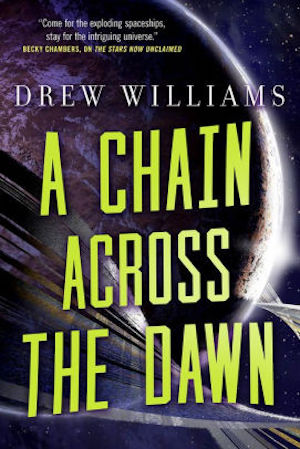As readers, we’ve known Cordelia for a long time. We met her in her thirties when she became Aral’s prisoner and then fell in love with him shortly after he fell in love on her. Cordelia has adopted Jole’s description of that.
We’ve seen Jole around, here and there—looking like a recruiting poster, acting as Aral’s ADC, as an admiral it is unwise to cross with your peculation scheme, and as pallbearer “for Sergyar”—but we don’t really know him. In chapter one, we learned he has some feelings for Cordelia and a past with Aral. In chapter two we elaborated on his feelings for Cordelia. We still have to get to know him and his relationship with Cordelia. And new readers have to figure out who Cordelia is, herself. So Cordelia and Jole have to talk. A lot. I love reading long conversations. The series we see in chapter three explores Cordelia and Jole’s shared pasts and their thoughts about the future, but it treads gently.
The first conversation follows immediately after the departure of most of the diplomatic guests from Cordelia’s garden party. They find a quiet garden alcove—the kind of place where you might, in wilder circumstances, find a young Vor couple who have snuck away from the party to neck—and talk through their days. Cordelia starts by reminiscing about Jole’s history of finding interesting things in his pockets after diplomatic receptions, like hotel keys and ladies’ underwear. This establishes that Jole is wildly handsome and that he and Cordelia have known each other for a very long time; Jole didn’t just have a relationship with Aral. Cordelia continues to trust Jole a great deal: She asks him to stand as guardian for her zygotes, in case of her death or incapacity.
This conversation also reminds us of what Cordelia has been through to get to the point where she can finally have her half-a-dozen daughters. There’s a graceful evocative moment here where Cordelia talks about offering to help Ekaterin hold Miles’s head under the water until he gives up the notion of having twelve children at once, and then just a little later talks about burning her bridges when she left Beta Colony. Cordelia’s plans have changed a lot since since Aral died, but not as much as they changed when he was alive. Her story about her first years on Barrayar reminds us that it’s a cruel planet. It also points out something I haven’t thought about for most of the series: Cordelia could have left at any time. She had a lot of reasons to make that choice. The Galactic Nexus is large, and even if Beta Colony was inaccessible, there were a lot of places she could have gone. Barrayar was not her only option. She chose to stay.
While Cordelia and Jole have a lot of shared history, there’s also some distance between them. Both of them remember Aral rubbing Cordelia’s feet after diplomatic receptions. It’s a lovely memory, but Jole doesn’t offer to do it here. I blame the nasal spray from the clinic for his hesitation. He’s not sure it’s worn off. Who knows what foot-rubbing might lead to with him under the influence. Despite his hesitation in the moment, Jole wants to close the gap between them. He invites Cordelia to go sailing. Cordelia, who wants to close the gap too, is thrilled to accept.
Their next meeting isn’t on the water—it’s dinner at the military base. Jole opens the evening with a tour of his many, many sacks of plascrete. It’s special high-tech plascrete, and has to be mixed with its activator and set before its expiry date, which is coming rather faster than the beginning of the construction project for which it is intended. It’s meant for the new base at Gridgrad, it’s sitting many miles away on the old base in Kareenburg, and it’s everyone’s problem. Except, apparently, the civilian supplier’s. It’s also an unexpected private space, which Jole uses to tell Cordelia about the progress of his zygotes. One of the eggs has failed. Jole had been thinking of one son, and then two, and then four. He’s suddenly mourning the loss of something he never previously imagined having. Cordelia flounders a little, trying to figure out what to say. Her years of diplomatic experience sometimes let readers forget how awkward she can be.
The conversation turns lighter again as Cordelia jokes about gossip. Although he recognizes the opportunity here, and despite his regrets about not having rubbed Cordelia’s feet, Jole opts not to kiss her at this time. On this occasion, it’s because he actually wants to do much more than kiss. Cordelia finds his reticence a little frustrating. Between her inner monologue and her conversation with Jole, she covers everyone’s history of interpersonal and sexual relationships here: her own history of ineptitude, Aral’s wild younger days after the death of his first wife, Jole’s history of picking up passes from all three sexes. If you want to, you can read this chapter as suggesting that Cordelia had affairs of her own. It’s subtle—I’m not sure it was intentional and if the idea doesn’t intrigue you, I don’t think you’ll notice it.
If Cordelia did have affairs of her own she’s not sharing the details, and it would be an odd thing to omit from this conversation given her argument against secrecy. There’s no need for Jole to keep his family planning a secret. He could tell anyone he bought some donor eggs. Jole points out her hypocrisy here: He did not purchase any eggs. Cordelia suggests there’s no need to borrow trouble, and she points out that Aral would have chosen publicity over secrecy; his older advisors wouldn’t have been surprised. His younger ones would, because they didn’t talk to their elders if they could help it. This seems to be transparently about Miles. He makes a lot of assumptions. One of the things I love about him is that sometimes he admits it.
Buy the Book


A Chain Across the Dawn
Over dinner, Jole lets Cordelia share her feelings about the location of Kareenburg—desert climate, active volcano, chosen for its strategic value rather than its sustainability, not as good as Gridgrad, where she hopes a lot of the Sergyaran population will be drawn with that area’s further development. Cordelia feels strongly about developing Sergyar, which is not a surprise when you remember that she found it, and was surveying it for Beta Colony when everything got exciting and she was confronted by a large number of life-changing choices in rapid succession.
This conversation is interrupted by Kaya Vorinnis, here with an invitation from Lord ghem Soren. It smells funny. She’s not sure what to do. Jole recommends a manual on Cetagandan correspondence and walks her through interpreting this example. It’s in a very correct style, scented with cinnamon, rose, and gardenia—warmth, affection, and hope. Jole leaves Vorinnis to decide what to do with it. And that is, of course, the theme for the whole chapter. Jole and Cordelia are sending each other proper but very subtle invitations, reflecting their warmth, affection, and hope.
If the chapter stopped there it would be too simple and too cute, so instead Jole finishes dinner with an Aral story: Once upon a time in the war of Hegen Hub, a Cetagandan envoy tried Aral’s patience with a series of elaborately and insultingly-scented letters. So Aral peed on one of them and made Jole return it to the sender. Cordelia remembers Aral as he was—a complicated, wonderful, dangerous, heroic man. Jole remembers him too. But public memory is a different thing. It trims off the complicated pieces—the dark, dangerous, scandalous person—in favor of a simpler hero. Maybe people need Aral’s memory as an icon, but maybe it would do more good to more people to come to grips with Aral as he really was. If Cordelia and Jole are any measure, knowing the details would not make the public any less bereaved.
Join me next week for chapters four and five—Cordelia revisits her early career and some Sergyaran teenagers light a fire!
Ellen Cheeseman-Meyer teaches history and reads a lot.










